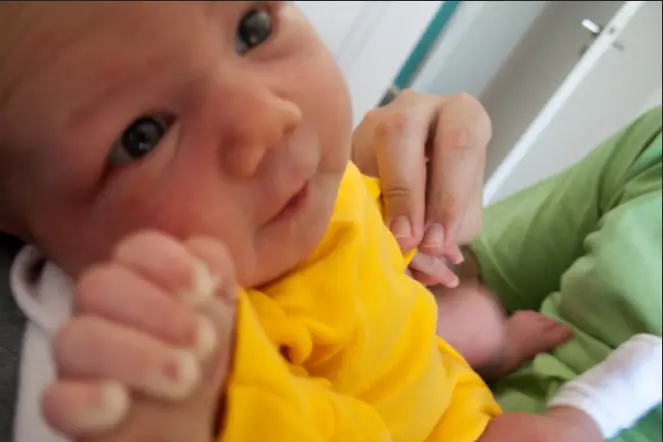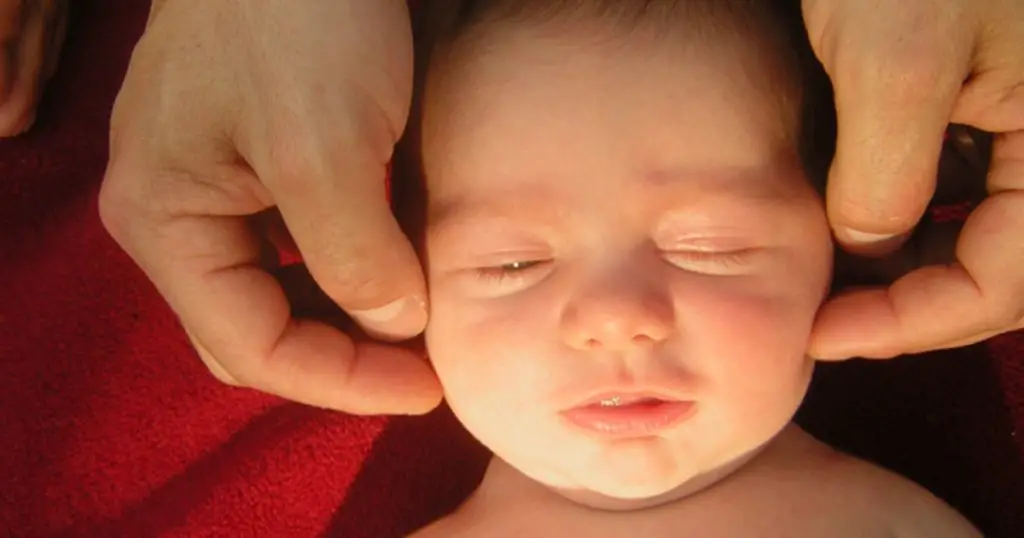Being a parent is quite a demanding job as you have to keep close eye on your kids at all times. And if you are a parent of an infant, that usually means spending sleepless nights trying to figure out why the little one cries, because honestly, sometimes it’s all babies do.
The first thing most parents do when their baby is crying is making sure they are not hungry, tired, and that their diaper is clean. But even if all these things are fine and the baby still can’t calm down, maybe you should consider using some of the remedies listed below.
1) Massage The Tips Of The Toes
Massaging specific parts of the infant can have soothing effect on the little one. If they are teething, experts say it would really help ease the pain if you massage the top of their teeny-tiny toes.

Source: Alyssa Pilney/Flickr
2) Swaddling Can Work Wonders
Swaddling the baby in a blanket gives them the sensation of still being in their mommy’s womb which helps calm them down.

Source: Andre Deak/Flickr
3) Rock-A-Bye Baby
Gently rocking the baby back and forth proved to be a very useful calming technique that even our parents and grandparents used quite often. This doesn’t come as a surprise as it really helps sooth the baby’s cries.
The right way to do it is to hold the baby in your arms as you move your hips back and forth with your legs placed far apart.

Source: Alyssa Pilney/Flickr
4) For Sinus Pain Or Discomfort
If the baby is experiencing sinus pain or discomfort try to ease the pain by applying gentle pressure on the central areas on the bottom of their feet.

Source: Red Rook/Flickr
5) More Massage
In case the baby shows symptoms of congestion in the chest and coughs, it would be for the best to visit a doctor. In the meantime, massaging them under the toes but above the arch will trigger feeling of relief.

Source: Cathrine/Flickr
6) Good Vibrations
Many parents say how the vibrating sounds of washers or dryers help their kids stop crying. In case nothing else helps, you may try placing the baby next to a machine that makes these types of sounds.
Provide constant supervision in order to keep your child safe.

Source: Ricardo Ko/Flickr
7) Sucking
Pacifiers calm babies easily and they are many times the little ones’ best friends. So in case you don’t have one, you may encourage the baby to suck their own thumb.

Source: NICHD/Flickr
8) Swing, Swing
If you can afford it, then buying a swing for your baby can be a great investment. Swings give babies that rocking and rhythmical sensation they love. Of course, make sure the model you get is suitable for your baby.

Source: Donnie Ray Jones/Flickr
9) Go For A Drive
Driving around is a great way of calming a crying baby. The vibration of a moving vehicle relaxes the babies. Before putting them in the car, always make sure they are safely placed in their car seat.

Source: Michael McIlwraith/Flickr
10) Skin To Skin
One of the best ways to make a baby stop crying is to allow skin-to-skin contact. So placing your baby on your chest will not only help the little one, but will allow you to have a great bonding time together.

Source: Tina Lawson/Flickr
11) Soothe The Solar Plexus
In case the infant feels tummy pain, their solar plexus, a bundle of nerves in the center of the torso, can be greatly affected. If this is the case, you can ease their discomfort by massaging the center of their feet.

Source: Amy the Nurse/Flickr
12) Super Sling
Using baby sling for carrying the baby allows for the little one to be close to you and feel safe and secure knowing their mom or dad are there right next to them.

Source: Andrew Dawes/Flickr
13) Rocking In The Rocking Chair
Rocking chairs are perfect for both the baby and the parent to enjoy together and take some rest. All you need to do is sit down comfortably and gently cradle the little one in your arms.

Source: Rockin’Rita/Flickr
14) Turn On A Fan
When you’ve tried it all but the baby is still fuzzy, maybe you should get a fan and just switch it on. The soft hum will help the baby fall asleep and calm down easily.
Just make sure you don’t place it too close to the infant as the cold air can have ab adverse effect.
15) Reflexology
Constipation and indigestion can be treated by massaging the area between the center of the baby’s feet and the pads of their feet as experts believe it helps ease the pain in the upper abdomen.

Source: miss pupik/Flickr
16) The Answer To Gas
Most infants struggle with colic as a result of their inability to release the gas from their body. Besides medications, a gentle massage of the area between the baby’s heel and the center of their feet can help a great deal as the nerves of this area are connected to the lower abdomen.

Source: Buster Benson/Flickr
17) White Noise Wonders
As we mentioned before, the sounds and the vibrations fans make can help calm a crying baby.
But, if you don’t have one around the house, there are plenty of videos online, or you can just turn on the vacuum cleaner.

Source: Mark Doliner/Flickr
18) A Simple Hush
Repeated shushing have the same effect as vibrating machines and fans, so if you hear parents saying ‘Shh’ to their babies every now and then, now you know they do it in order to calm them down.

Source: Nate Davis/Flickr
19) One Final Foot Massage
This particular massage is one every parent needs to know of. As the nerves in the heal are linked with the pelvis and the tummy, massaging this part offers quite a relief.
20) Head Outside
Babies can get bored easily, so if they won’t stop crying and you believe they are not in pain, then you should just take them out for some fresh air. The new things they perceive and the different sounds they hear may help them calm down and get interested in the surrounding.

Source: K Tao/Flickr
21) Singing
Singing lullabies, of course, is the perfect way of getting your bundle of joy calm. No matter if you are not good at singing, your voice is something the baby is the most familiar with and it will make for a great bonding experience, too.

Source: makelessnoise/Flickr
22) Bath Time
Who doesn’t enjoy taking a nice bath. It’s calming and help release all your senses. Warm water is an excellent relax therapy and your baby will definitely enjoy it.

Source: Scott/Flickr
23) Turn Off The TV
Little babies can easily get overwhelmed by all the light and the noises that surround them. Very often, this might be the reason for their uncontrollable crying. So whenever you feel the atmosphere in the house is too dense, just turn the TV off and dim the lights.
24) Check The Temperature
Always make sure the temperature in the house is the right one. As feeling too hot or too cold may result in the baby feeling uncomfortable.

Source: Ged Carroll/Flickr
25) The Colic Carry
The ‘colic carry’ or ‘the colic hold’ is a super helping technique when it comes to soothing any pain or discomfort at the baby.
If you haven’t heard of it already, it’s a technique of holding the baby stretched out on your forearm. This applies gentle pressure to their stomach and relieves the pain.

Source: Andrew Laing/Flickr
26) Play Time!
Play time equals fun time. No matter how young they are, all babies love playing with toys. It helps keep them entertained and forget of the crying, at least for a while.
Many times, simple games as peek-a-boo do wonders!

Source: Derek Dysart/Flickr
27) General Massage
Fussy babies react greatly to any form of massage, so whenever they feel nervous, just try massaging the baby’s head, forehead, their arms, and legs. Actually, give them a massage on the whole body.

Source: Valentina Powers/Flickr
28) Nursing Problems
If your baby is not at ease and you are nursing, it might be that some of the foods you consume to trigger gas at your infant and irritate them.
So in case you are breastfeeding, make sure you avoid coffee and dairy products as much as you can.

Source: Jessica Pankratz/Flickr
29) Teamwork
If you’ve tried most of the techniques mentioned above but the baby is still crying, it might be just the time for the other parent to take the role.

Source: gautsch./Flickr
30) If All Else Fails…
If nothing really helps calm your baby down, maybe something more serious is in question, so if the crying doesn’t stop for a longer period of time, always consult with a pediatrician.

Source: rabble/Flickr
